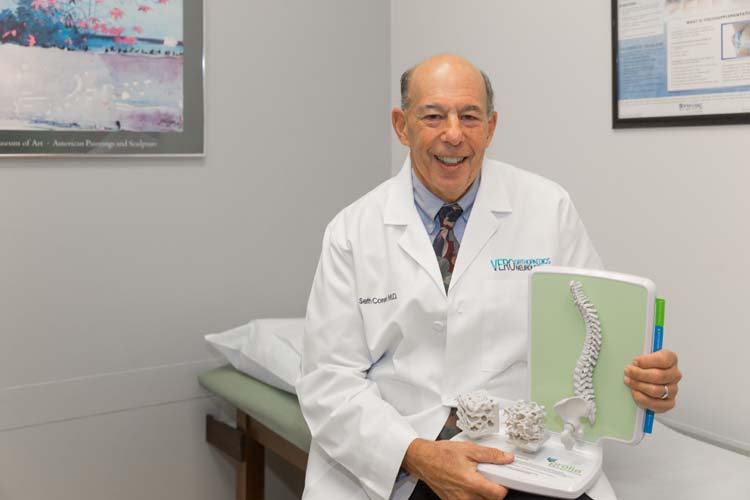
Many people – women especially – have both Type 2 diabetes and osteoporosis. This isn’t surprising, as the risk of both conditions increases with age, and Type 2 diabetes directly affects bone strength. But, until recently, research studies largely ignored this link.
A comprehensive review recently published in the Endocrine Society’s Journal of Clinical Endocrinology & Metabolism changes that. The researchers, from the National and Kapodistrian University of Athens, Greece, systematically reviewed the effects of medications on both Type 2 diabetes and osteoporosis and determined that certain diabetes medications affect bone metabolism.
Seth Coren, M.D., a Vero Beach orthopedist with a sub-specialty in osteoporosis, says osteoporosis – commonly defined simply as a condition in which bones become weak and brittle – is actually very complex.
“Osteoporosis is not just one thing,” he says. “It is a multifactorial disease, with many interrelated causes.” In addition to gender and age, those causes include genetic factors, inadequate consumption of calcium, inadequate consumption of vitamin D, smoking, lack of exercise, and excessive consumption of alcohol and caffeine.
The study concluded that there are Type 2 diabetes medications that help protect bone health, and are therefore preferred for people who also have osteoporosis. Here are those medications, with their common (and tongue-twisting) brand names in parentheses:
- Metformin (Glumetza, Glucophage, Fortamet)
- Sulfonylureas (Glibenclamide, Glimepiride, Glipizide)
- DPP-4 inhibitors (Sitagliptin, Linagliptin)
- GLP1 receptor agonists (Liraglutide, Exenatide)
The researchers also concluded that certain Type 2 diabetes medications are to be avoided, such as TZDs and canagliflozin, because of their negative effect on bone metabolism. Insulin, the researchers say, should be used with caution because it can cause low blood sugar and dizziness, which increases the risk of falls and fractures.
Dr. Coren is familiar with the published review. He says lead author Dr. Stavroula A. Paschou has conducted much research on osteoporosis and he “has a level of trust in its conclusions.”
Taking a diabetes medicine that helps bone health is also an important consideration for people who don’t have osteoporosis, as studies show the risk of fracture is increased in people with Type 2 diabetes, especially if they have had the condition for a long time, if it is poorly controlled, or if it has caused other health complications.
Dr. Coren has specific guidance for those in the community who are over age 50:
- Include at least 1,200 (but not more than 1,600) milligrams of calcium in your daily diet. Calcium supplements are readily available, and good food sources include yogurt, cheese, sardines, kale, broccoli and almonds.
- Get your vitamin D levels checked. We need vitamin D to absorb calcium as part of the bone-building process, and we don’t know if we need a supplement unless we are tested.
- Engage in “resistance” exercise. This is a type of exercise that causes the muscles to contract against what is called an “external resistance,” which can be dumbbells, rubber exercise tubing, bottles of water, or your own body weight. The goal of resistance exercise is to increase strength, tone and muscle mass and to slow down sarcopenia (the loss of muscle tissue as a natural part of the aging process).
- Undergo a bone density evaluation. Women over age 50 and men over age 70 should get a baseline evaluation, as should people who have experienced a “fragility” fracture, a fracture resulting from a fall from a standing height or lower.
Dr. Coren also recommends that people with osteoporosis visit the National Osteoporosis Foundation website at www.nof.org. “It has a lot of valuable information,” he says.
Dr. Coren’s practice is part of Vero Orthopaedics and Neurology, located at 1155 35th Lane, Suite 100 in Vero Beach and 801 Wellness Way, Suite 100 in Sebastian. The phone number for both locations is 772-569-2330.



